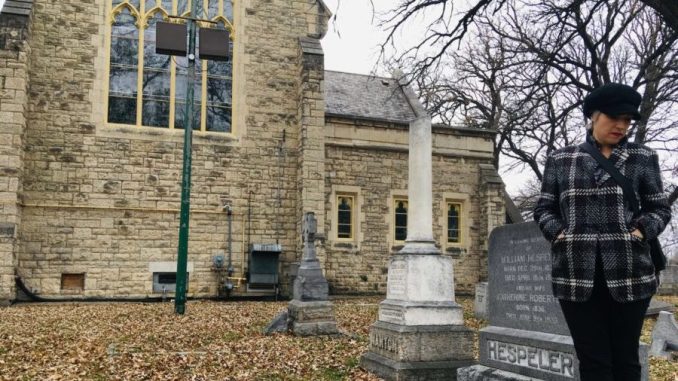
One surprisingly cold day in early November, we decided to visit St. Johns Anglican Cemetery, to see William Hespeler’s grave. He was born in 1830 in Baden-Baden, a German town near the French border, and he died in Vancouver in 1921. But he was laid to rest in Winnipeg. Clearly Winnipeg meant something to him… and he meant a lot to Winnipeg. Particularly the Mennonites of Winnipeg, and southeastern Manitoba.

I mean, take a cursory glance at any sort of map of the region, and you’ll see Hespeler’s name plastered all over the place. Winnipeg and Steinbach have streets named after Hespeler. You can find a road named after Hespeler in the RM of Stanley. Niverville and Winnipeg have parks named for Hespeler. And Niverville itself was initially going to be called Hespeler… because he’s the one who started it all. (In the end, the CPR named it Niverville, after the train station located there. I feel like there’s more to the story?)
So what’s the deal with William Hespeler? Well, he’s the reason we’re Canadians, not Americans.
The short, Erin-esque version of the story is this: being a wealthy businessy European guy, he had connections and traveled, and thus in the 1870s he heard about the Mennonites in Russia who had run out of land and were thinking they’d go settle in the U.S.A. Well, Hespeler knew the government in Canada wanted to put their own settlers along the northern side of the border to claim it as their own, and he figured a bunch of white farmers would do the trick. He acted as the connection between the Canadian government and the Mennonites of Molotschna and Bergthal, making arrangements and urging them to select delegates to come check it out. I guess if he hadn’t come along, the whole Canada thing might not have even been an option for our immigrating ancestors of the 1870s. Such a weird thought.
There is some sadness to his story. Having been born in Germany, he empathized with the challenges that Canadian citizens of German descent experienced during the first world war, as they were viewed with suspicion and had trouble maintaining employment. His efforts to help these people at this time caused his popularity and influence to decline. He died a three-time widower, far from the Winnipeg he loved.

